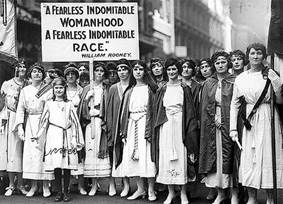Women's History Month and Feminism
- Filed under "empowerment"
- Published Thursday, March 9, 2023
- « back to articles

Women’s History Month is, of course, an important month for Chrysalis. Throughout the month of March, we’ll hear and see stories about remarkable women whose lives have made a difference in their communities, their societies, and to culture in total. One of the terms most recognized this month is feminism.

Feminism. This is a word that often puts people off – most often because people don’t know or understand its history and the major changes it effected. A recent article in Ipsos notes that in most polls, fully one-third of men report believing that feminism does more harm than good. But feminism, history notes, built our nation – from the abolition of slavery to universal education to the social safety net – feminists drove positive change.
Interestingly, before the name came about, opponents of feminism described these efforts as disloyal and disruptive as early as 1776, when President John Adams started the trend. When American independence was imminent, Adams’ wife Abigail posited her hope that Congress would stop treating women as “vassals of your sex,” reminding her husband that men “would be tyrants if they could.” She further suggested that women should have representation in government, otherwise the newly created laws would be unfair.
Unfortunately, John Adams teased that his wife and “her tribe” bordered on insubordination, contending that her concerns were silly and advising legislators to guard against such requests or “there will be no end of it.” Undaunted, Mrs. Adams continued to remind her husband that women could educate the next generation if permitted to obtain higher education, rather than being banned from secondary schools.
But only a few years later, when founders were drafting the Constitution, male advocates launched the first “Ladies Academy” in Philadelphia, prompting a second to be started in New York City. Within a few decades over 360 female academies opened across the country, paving the way for universally available public schools. This opportunity for education triggered the industrial revolution by creating a skilled workforce unmatched throughout the world.
Feminists drove efforts to abolish slavery and the women’s vote helped create the opportunity for the African American vote (promised by the 15th Amendment but not secured until the Voting Rights Act of 1965). The first woman to serve in the U.S. Cabinet, Secretary of Labor Frances Perkins, led efforts to pass Social Security in 1935 and minimum wage in 1938. Later successes included women doubling the country’s workforce by eliminating the requirement that pregnant women could not work, as well as establishing the definition of marriage as a romantic partnership between equals.
Even throughout the 20th century, feminists were labeled as “ball-busters,” facing ridicule and mockery. Today, male supremacists such as the Proud Boys continue this scorn, describing feminists as “punchable” and “not women anymore.”
For those who don’t understand, feminists are anyone who believes that women should have every opportunity men do – including many rights and principles that often cause dissent, such as reproductive rights. Working toward national peace and unity means honoring values that promote conversation, even when there are differences.
As we celebrate Women’s History Month, remember what former first lady Eleanor Roosevelt shared: “The fundamental premise of feminism is that women should have equal opportunity and equal rights with every other citizen.”